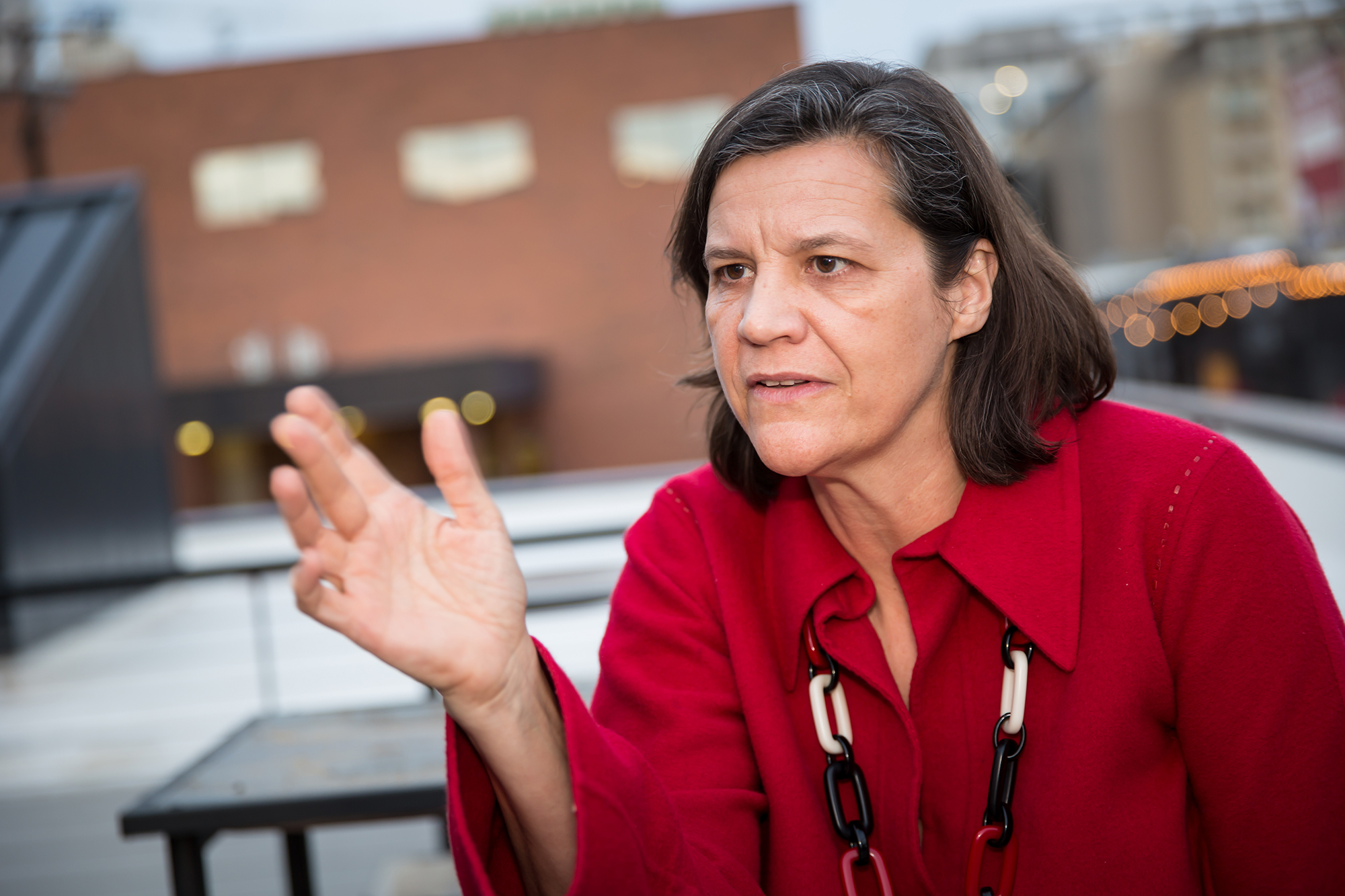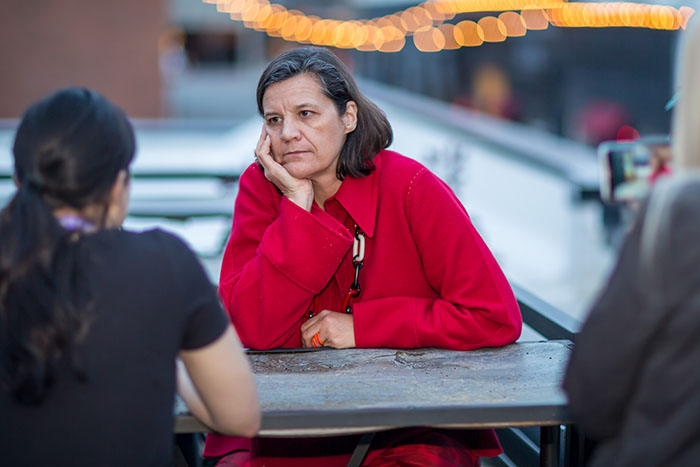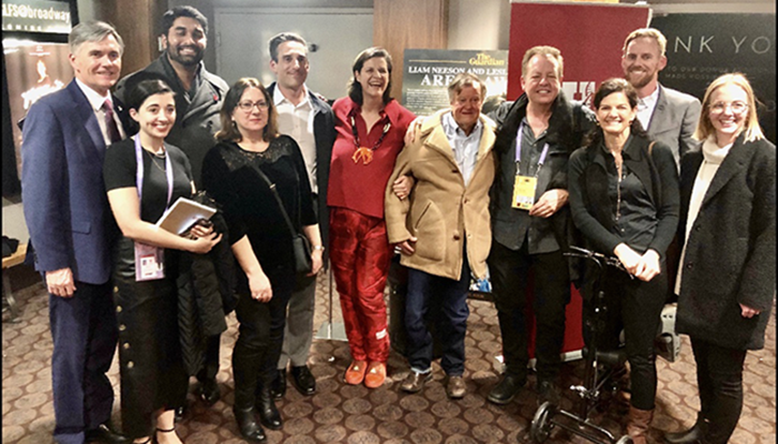

Filmmaker Kirsten Johnson on Life, Loss, and Alzheimer’s
In support of the premiere of "Dick Johnson Is Dead" at the 2020 Sundance Film Festival, University of Utah Health hosted a community screening with director Kirsten Johnson to discuss Alzheimer’s disease, dementia, aging, and mental health.
Author: Nafisa Masud
When filmmaker Kirsten Johnson lost her mother to Alzheimer’s in 2007, the loss was one punctuated by small, painful moments—forgotten routines, a lack of balance, names evaporating into air like thin wisps of smoke. “She was a beautiful, brilliant woman who disappeared into dementia,” Johnson says. Losing her caused enough grief for a lifetime.
Exactly 10 years later, Kirsten’s psychiatrist father Dick was diagnosed with the same disease. He, along with 5.8 million Americans (including his late wife), would start experiencing an alarming loss in memory, reasoning, decision-making abilities, and social withdrawal before an eventual death.
This time around, Kirsten was determined to grieve another way. Instead of shrinking away from death, she would turn toward it. She would play with mortality. She would capture her father in film, ensuring him a life eternal. She would name it aptly: Dick Johnson Is Dead.
In support of the film’s premiere at the 2020 Sundance Film Festival, University of Utah Health hosted a community screening of Dick Johnson Is Dead to further the discourse on Alzheimer’s disease and all those affected by it. Below, director and daughter Kirsten Johnson shares her story.

University of Utah Health: Tell us about yourself.
Kirsten Johnson: I’ve been a documentary cameraperson for 30 years. In 2016, I completed Cameraperson, where I used footage that I had filmed in 86 countries. In the film you just drop into Bosnia, drop into Yemen. But I also included footage of my children and my mother, who had Alzheimer’s over the course of seven years. She was someone who didn’t want to be filmed, and she certainly wouldn’t have wanted to be filmed in her fully demented state. But I was desperate because I knew she was about to die. I thought I would never look at it . . . In many ways, I felt it was a betrayal of her because she was a beautiful, brilliant woman who disappeared into dementia. Cameraperson brought her back to life and inspired me to make Dick Johnson Is Dead. Because, damn it, my dad got dementia too.
“So we came up with this idea: I'm going to make a film in which I kill my father, over and over, until he really dies.”
U of U Health: How did you react when you found out?
KJ: I thought I was done! I thought I only had to do it once. I had so grieved my mother. But I thought, “My father is a really funny man and maybe cinema could help us go through this process together.” So we came up with this idea: I’m going to make a film in which I kill my father, over and over, until he really dies. It’s a crazy idea to be impudent in the face of death—to be sacrilegious and say, “Screw you, death. Screw you, dementia. You can’t take us down one more time.”
Of course, they’re going to beat us. This film is obviously a failure from its inception. But the idea was, “Is there a way that the movie can help me rebuild my father as dementia pulls him apart? Is there a way that he can live forever because he’s in the movie?”‘
From Seventh Day Adventism to Sundance Film Festival
U of U Health: As a child, your parents didn’t allow you to watch movies. How did films go from off-limits to your line of work?
KJ: My father was slightly subversive. He did things like taking us to a film series at the University, which wasn’t “really” going to the movie theater. Our family was Seventh Day Adventists, and my mother was very devout. I was an incredibly devout kid. I really believed in God, and that God could know my thoughts before I thought them. As a construct, that’s a very powerful thing. I believed that God was paying attention to all of my choices. But when I was very, very young, I noticed that there was racism in the world and thought, “Wait a minute, I don’t understand.” I just started wondering . . . It’s supposed to be this rainbow world where everyone’s equal, but something was wrong with this picture.
I was a questioner from the beginning, a very earnest kid. My parents were very loving. I had no authority to rebel against. But then I ended up going outside of the Adventist school system, and when I went away to college, I really got involved in anti-apartheid activism. I saw the films of some West African filmmakers and was like, “Wow, okay, this is really different from the American story.” I started to think about all the things that movies could do. It was uncomfortable because it was territory I was not supposed to be in.
"I'm really questioning all kinds of things. Can we defy death? Can we question the seriousness with which we take our own lives?"
In some ways, I was trained to be a missionary, but I became much more of a human rights activist. At a certain point, the serious conviction of human rights activists reminded me of the conviction of religious people. I realized, “It seems like the world’s more complicated than this.” Cameraperson was the first foray into questioning everything. With Dick Johnson Is Dead, I’m really questioning all kinds of things. Can we defy death? Can we question the seriousness with which we take our own lives? It’s a very experimental, playful film. And it has some laughs in it, which I’m very proud of.
U of U Health: How did you introduce the idea to your dad, especially following a hard diagnosis?
KJ: I think about the ways in which we try to deny death or deny dementia. We put someone away when they are no longer quite themselves. And this process has meant that I continue to place my father in interaction with other people. It’s given us a way to be in the world together.
And yet, you know, the world is disorienting to him now. On the way down the mountain [from Park City to Salt Lake City], he asked probably seven times, “Where are we? What are we going to see? Oh, we’re going to see Dick Johnson Is Dead again.” But then he’s like, “Oh, I can watch it again.” Because he’s revisiting his past, his friends, his family, his home. He’s a really emotionally brave person who doesn’t take his own reputation too seriously.

Finding the beauty and humor in Alzheimer's disease
U of U Health: While watching your father as the disease progressed, were there elements of his identity that you appreciated more?
KJ: What a great question. Don’t you think it’s totally fascinating? Like, what is consciousness? How does this person lose so many of the capacities that they had before and still maintain their spirit? With my mother, new things emerged that I had never seen before. I learned that she was carrying guilt for something that she couldn’t have controlled in her life. It was inside of her and she’d never revealed it to us.
With my father, it’s pretty fantastic because so far there haven’t been any other revelations than the fact that he is a caring person. For example, the other night at 1:00 am, he woke up and he said, “There’s a patient waiting for me downstairs.” I said, “No, dad. There’s no patient.” He was like, “No, I’m sure there’s someone who’s suicidal downstairs.”
I thought, “Okay, what am I going to do? I’m going to get out of bed, get dressed. He’s already dressed. Let’s go downstairs. ‘Cause he’s totally insisting that there’s someone there.” We get down there. He looks around and we’re in the lobby of my building in Manhattan. He’s like, “Oh, there’s no patient here, is there?” I said, “No.”
And he said, “It must be so heartbreaking to watch your father falling apart.” Then he said, “You really should call the guys from the loony bin to come and put me in a straitjacket. But if they take me away, you’re really going to miss me.”
"It must be so heartbreaking to watch your father falling apart."
U of U Health: Wow.
KJ: The triple flip of that, right? All the positions that he’s occupying: I’m the psychiatrist. I’m here to help someone. I’m a crazy person. I feel empathy for you, my daughter, who’s watching me lose my mind.
I do feel like there’s something clearly terrible in this disease, but there’s also something deeply beautiful in the nimbleness of it. It feels like some crazy prism with many facets. What I learned with my mother is there’s all these hilarious things that happen, too. How could I bring the hilarity and absurdity and surrealism of Alzheimer’s or dementia into a movie? Because that’s what we all want from movies. We can’t only cry in life because it’s just too painful.
U of U Health: What kinds of hilarious moments happened with your mom?
KJ: My favorite one is when I was sitting in the backseat of the car with my mom. Our legs are really close to each other, Mom starts laughing hysterically, and she says, “I don’t know how this happened and I don’t know what I’m going to do with it, but I’ve got a third leg.”
I think the Alzheimer’s affected her perception. She’d often think a shadow was a hole, so she wouldn’t want to step on a shadow . . . or she would think what she was seeing in front of her was what was behind her, so she wouldn’t want to sit down.
I remember one time when we had her in a boat, I was lifting her onto the dock, and she became convinced I was pulling her into the water. It’s like this total death struggle—me trying to pull her up and her trying to pull me into the water. That’s what I find so amazing about this. It’s also metaphoric, right? We’re both trying to pull each other into this different reality and we have opposite realities. In some ways, I had to treat her the way you have to treat a child. It’s like, “You don’t understand. I understand, and I am pulling you back from danger.”
“How could I bring the hilarity and absurdity of Alzheimer’s and dementia into a movie? Because that’s what we all want from movies. We can’t only cry in life because it’s just too painful.”
A new approach to aging
U of U Health: The film finds you reconfiguring a new approach to death. As a parent yourself, how have you shared that with your kids?
KJ: Before I had kids, I thought that you just had one conversation about an important topic. Of course, what I have learned is that at each age or moment of their emotional understanding, you revisit things. In this process of making the film with my father, we talk all the time about his death. I feel like my children will never be prepared for their grandfather’s death, and yet we’ve talked about how Grandpa can trip and fall and hit his head and die, and he will not ever speak to them again . . . Most kids don’t know that ahead of time. They only learn it once they experience it.
In some ways, we’ve done this pre-traumatic stress therapy. We’ve played around with it and had a period when we were brainstorming about what kind of stunt would be the stunt that killed my father. The kids were coming up with these crazy ideas based on cartoons and movies, and they were so excited to offer them: “We could have an anvil drop on his head . . . and then Grandpa would trip here and roll down the hill.”
I remember one time we were at this restaurant and the kids were supplying me with all these ideas about how we could kill Grandpa. And I suddenly looked over and there’s a woman overhearing the conversation! But it’s been great. I think there’s a way in which the kids understand we’ll only have him for a certain time frame. We don’t know what that is, but they have an idea that that is possible as opposed to only experiencing it as a traumatic event.
U of U Health: That’s beautiful.
KJ: I think it might be. I don’t know. I think it’s interesting. I don’t know if it will help them. I don’t know if this is going to help me, but I just had to try something different, you know? I felt like I’d already done it one way and might as well give this a whirl. We really did give a chance for my father’s friends to get to say goodbye to him. We did his funeral in advance of his death and we did it after the dementia had started, but not before the dementia was so advanced that he couldn’t engage with people.
"It's a new way of seeing the world... living in the eternal present. It's actually a really interesting way to live."
Where can we watch "Dick Johnson Is Dead"?
U of U Health: With Dick Johnson Is Dead now streaming on Netflix, what would you like viewers to leave the film with?
KJ: I’m totally curious about what people bring on their own. I don’t have a mission. I’m not trying to get people to think a specific thing. I’m just sharing my experience of need in this situation—trying to, in some ways, share my questions. I wanted to leave space in this movie for people to relate to their own dilemmas. But I’m constantly being stimulated by dementia.
It just makes me think: “What is a human? Who is my dad? If he can’t remember where we are, why we’re here, but he still has his same spirit, what is that?” He knows me now. But he may not know me in the future, or he may know me all the way to the end. I don’t know.
The other story I tell about my mother is a moment where I was stroking her hair and she said, “Oh, has Kirsten gone?” And I said, “No, I’m right here.” And she said, “Oh, that’s so interesting. Your touch was reminding me of you.” The idea that we’re known in many ways, and that she could experience that for the first time again.
There’s also a scene in the film where you’ll see my father discovers that [my kids are] making a cake. My son says, “It’s a good thing that he won’t remember. It’ll be a surprise.” It’s a new way of seeing the world, like maybe forgetting things and living in the eternal present. It’s actually a really interesting way to live.
U of U Health: Okay, final question. You’re not looking for people to leave with anything specific when they see the film. When you saw the finished product for the first time, what did YOU leave with?
KJ: I was really afraid that I had failed to capture my father’s essence, because I don’t want to live without it in the world. And I think I did it. I captured lightning in a bottle. For the rest of my life, once he’s gone, I can go to this film and find him. My children can find him.
Watch Dick Johnson Is Dead on Netflix or view our full interview with Kirsten Johnson below.